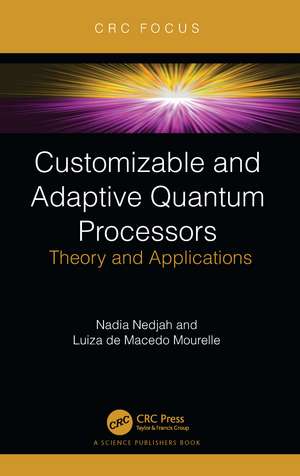Customizable and Adaptive Quantum Processors: Theory and Applications
Autor Nadia Nedjah, Luiza De Macedo Mourelleen Limba Engleză Paperback – 9 oct 2024
| Toate formatele și edițiile | Preț | Express |
|---|---|---|
| Paperback (1) | 107.70 lei 6-8 săpt. | |
| Science Press – 9 oct 2024 | 107.70 lei 6-8 săpt. | |
| Hardback (1) | 303.74 lei 3-5 săpt. | +13.17 lei 6-10 zile |
| Science Press – 12 ian 2023 | 303.74 lei 3-5 săpt. | +13.17 lei 6-10 zile |
Preț: 107.70 lei
Preț vechi: 164.24 lei
-34% Nou
Puncte Express: 162
Preț estimativ în valută:
20.61€ • 21.29$ • 17.14£
20.61€ • 21.29$ • 17.14£
Carte tipărită la comandă
Livrare economică 19 martie-02 aprilie
Preluare comenzi: 021 569.72.76
Specificații
ISBN-13: 9781032382326
ISBN-10: 1032382325
Pagini: 136
Ilustrații: 100
Dimensiuni: 138 x 216 mm
Greutate: 0.25 kg
Ediția:1
Editura: Science Press
Colecția CRC Press
ISBN-10: 1032382325
Pagini: 136
Ilustrații: 100
Dimensiuni: 138 x 216 mm
Greutate: 0.25 kg
Ediția:1
Editura: Science Press
Colecția CRC Press
Public țintă
AcademicCuprins
SECTION I: THEORY 1. Introduction to Quantum Computing 2. Quantum Concepts 3. Quantum Operators SECTION II: APPLICATIONS 4. Quantum Processor Macro-architecture 5. Calculation Unit Micro-architecture 6. Control Unit Micro-architecture 7. Quantum State Measurement 8. Quantum Instruction Simulation 9. Final Book Remarks
Notă biografică
Nadia Nedjah has degrees in Systems Engineering and Computation- Bachelors (1987) and M.Sc. (1990), both from University of Annaba, Algeria, and a Ph.D. (1997) from University of Manchester – Institute of Science and Technology, UK. She joined the Department of Electronics Engineering and Telecommunications, State University of Rio de Janeiro as a Full Professor in electronics engineering. She has authored three books on Functional and Re-writing Languages, Hardware/Software Co-design for Systems Acceleration and Hardware for soft Computing vs. Soft Computing for Hardware. She has also co-edited more than 20 special issues for high impact journals and more than 45 organized books on computational intelligence related topics, such as Evolvable Machines, Genetic Systems Programming, Evolutionary Machine Design: Methodologies and Applications and Real-World Multi-Objective System Engineering. She (co)-authored more than 120 journal papers and more than 200 conference papers. She is Associate Editor of more than 10 international journals, including International Journal of Electronics (TF), The VLSI Journal (Elsevier) and Microprocessors and Microsystems and IET’s Computer & Digital Techniques (Elsevier). She organized several major conferences related to computational intelligence (for more details, see http://www.eng.uerj.br/~nadia/ english.html).
Luiza de Macedo Mourelle holds a degree in Electronic Engineering from the Federal University of Rio de Janeiro (1980), a Master’s degree in Systems and Computer Engineering from the Federal University of Rio de Janeiro (1988) and a PhD in Computing from the University of Manchester Institute of Science and Technology. (1998). She is currently a full professor at the State University of Rio de Janeiro and a research fellow at the National Council for Scientific and Technological Development. She has interest and experience in Computer Science, with emphasis on Computer Systems Architecture, working mainly on the following topics: hardware, VHDL, FPGA, synthesis of digital systems, embedded systems, co-design, interconnection networks and computational intelligence.
Luiza de Macedo Mourelle holds a degree in Electronic Engineering from the Federal University of Rio de Janeiro (1980), a Master’s degree in Systems and Computer Engineering from the Federal University of Rio de Janeiro (1988) and a PhD in Computing from the University of Manchester Institute of Science and Technology. (1998). She is currently a full professor at the State University of Rio de Janeiro and a research fellow at the National Council for Scientific and Technological Development. She has interest and experience in Computer Science, with emphasis on Computer Systems Architecture, working mainly on the following topics: hardware, VHDL, FPGA, synthesis of digital systems, embedded systems, co-design, interconnection networks and computational intelligence.
Descriere
The book reviews the concept of quantum unitary, binary and ternary quantum operators as well as the computation implied by each operator. It provides details of the quantum processor, providing its architecture, which is validated via execution simulation of some quantum instructions.
